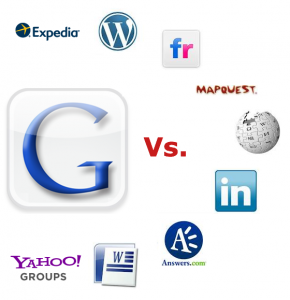
Google’s acquisition of Frommer’s was recently in the news, but most of the news coverage missed the point about Google’s evolution from a search company to a content publisher, and what it means for search marketers.
Most commentators take this as further evidence that the ad giant is making a play to dominate travel bookings end-to-end, not just travel search. (The main prior evidence was Google’s acquisition of ITA software, which powered flight search for most of the industry including many competitors.)
That’s accurate, but it’s only part of the story.
Consider how Google participates in lots of content markets. Google:
1. Keeps increasing how much content it publishes directly in search results, such as Maps or the variety of “Answers” type content like last night’s sports scores, movie screening times, etc.
2. Publishes the biggest collection of video ever, Youtube, and recently bought a major creator of Youtube content, Next New Networks.
3. Runs Blogspot.com (the #2 blogging CMS behind WordPress) and JotSpot, a wiki CMS company that they turned into Google Sites.
4. Tried to battle Wikipedia / About.com / Demand Media with Knol. (It failed and transitioned Knol to … scholarly publishing on WordPress.com / WordPress themes.)
5. Tackled the “microblogging” market with Google Plus, thus competing with the fastest-growing text-content platforms, Twitter and Facebook.
 Google is a content machine. They publish, host, and offer the tools of content production in over a dozen verticals.
Google is a content machine. They publish, host, and offer the tools of content production in over a dozen verticals.6. Publishes Picasa and Panoramio, image-sharing competitors to Flickr.
7. Bought BeatThatQuote a large financial services affiliate, which the affiliate marketing world aptly refers to as a “publisher.”
8. Has a foot in the ‘groups’ world fighting #1 Yahoo Groups. (Think LinkedIn groups before LinkedIn provided the added networking/referrals value.)
9. Publishes millions of blogs’ RSS feeds through its Feedburner service and of course, offers its Google RSS Reader.
10. Aggregates content for people into the iGoogle start page.
11. Acquired Zagat, a popular restaurant review specialist.
12. Created Google Docs to compete with Microsoft’s desktop publishing suite.
13. Bought Sketchup, a 3D modeling tool.
To summarize, Google is publishing more and more content that it either owns or for whom it serves as a publishing platform.
So, the librarian is increasingly the author/publisher of the library’s books. Guess whose books will be borrowed most ;)?
(Amusingly, I suggested in 2007 that directories made obsolete by Google turn into peer-edited publishers. That’s the path Google has taken by acquiring several expert publishers like Zagat, Frommer’s, BeatThatQuote, and attempting that angle with Knol, now a.k.a. Annotum.
Fortunately, there are solutions and ways to compete with Google Publishing successfully.
1. First, and most to the point, the Department of Justice should be lobbied to break Google up and separate the content publishing from search.
The conflict of interests is flagrant, and Google’s dominant position in search means the conflict has to be taken seriously. Yahoo also offered a search engine alongside its own content, but it never had the market dominance to kill off competing content services.
You can submit an antitrust complaint email to the DoJ to start.
2. Paywalls enable quality content to pay for itself provided the content is good, and the marketing department works hard.
 Weilly sold Frommer’s to Google – but publishers can still beat Google at publishing.
Weilly sold Frommer’s to Google – but publishers can still beat Google at publishing.So, it looks like more and more publishers are going to choose this angle. The digital marketing world notably has seen this transition already for a few years with paid-members-only content at EricWard.com, SEOBook, SEOmoz, DigitalMarketer.com, SearchEngineLand, SEO Training Dojo (Dave Harry et al), Certified Knowledge (Brad Geddes), PPC-Coach, PPCBlog.com, StackThatMoney (affiliate), MarketingSherpa, etc.
A correlation of this is that content producers who were burned by Google’s Panda/Penguin updates are now turning to the App Store (it’s Google vs. Apple vs. Others) and Kindle to monetize their content.
3. Free content can continue to exist successfully offline; print in its various forms doesn’t need to die, it just needs a better business model.
It’s easy to picture a solution combining QR-codes and DropBox for lead generation. A reader of a print article on tulip care might be able to scan a QR code to get an extended guide from a tulip-bulb-merchant, delivered directly to the reader’s DropBox in exchange for the reader’s name, email, and mailing address.
4. Curate content beyond Google.
The same way Barry collects together the SearchCap, recapping the day’s search news, it’s foreseeable that individual niches, especially the lucrative ones, will have their own librarians spring up and collect and publish links.
Many people visit these sites directly (i.e. bypassing Google) to discover new content. The Drudge Report, a daily collection of political links, started as a one-man show that was comfortably making a six-figure income.
5. To compete in the content-publishing space, you need a community.
Specifically, that community needs to be invested in your tool/platform, and that community has to be the biggest/fastest growing. I have to mention FeverBee, an excellent blog on developing a community.
One way in which that happens is when community members contribute to the platform’s development, i.e. WordPress, and build relationships with each other, i.e. Flickr, Yahoo Groups, Wikipedia.
 Both quantity and quality matter in a community.
Both quantity and quality matter in a community.Contrast that with Mapquest, a content source people appreciated but didn’t contribute to, which has been dying a slow death to Google Maps, and it’s easy to see why MapQuest failed (it’s always easy in hindsight).
This is also why, IMHO, SEOmoz has grown into the largest search brand around when SearchEngineWatch and others had a long head start. The forums at SEW were excellent, but a secondary aspect to the business, whereas SEOmoz made the community a core part of their business with one of the first points systems for user contributions (comments or posts), and their Q&A on the backend.
Word of mouth is still the best marketing around; search be damned. If you can get a following via social, then tap social for all you can!
6. Email remains most people’s online optin medium of choice for quality content.
That’s at the core of a lot of industries’ strategies evolving away from search, and should be at the core of your work, too.
Summary for the ADD Crowd:
Google isn’t just the highway to content … it’s also the destination. Frommer’s is only the latest in a long evolution that has lead Google to compete in over a dozen content publishing verticals.
We, publishers, should complain to the government about Google’s anti-competitive (a.k.a. antitrust) behavior. There’s a conflict of interests between helping people find content and providing the content yourself.
Changing your business model is key, which can include:
a. Paywalls, be they for membership sites, books, etc. still work. See e.g. Amazon Kindle’s vast library of available content or the Apple AppStore.
b. Lead generation for free content
c. Cheaper to produce content aka link aggregation.
Better marketing is also an essential part of the formula for publishers and can have different aspects including:
a. Community building
b. Newsletter list growth




